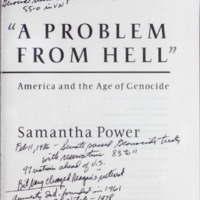-
Title
-
A problem from hell : America and the age of genocide
-
Description
-
A Problem from Hell is a path-breaking interrogation of the last century of American history. Samantha Power poses a question that haunts our nation's past: Why do American leaders who vow "never again" repeatedly fail to marshal the will and the might to stop genocide? She provides the answer in the form of the suspenseful story of courageous individuals who risked their careers and lives in an effort to get the United States to act. Drawing upon exclusive interviews with Washington's top policymakers, access to thousands of pages of newly declassified documents, and her own reporting from the modern killing fields, Power shows how those who urged U.S. action were thwarted again and again by ignorance, indifference, and, above all, a failure of imagination."--BOOK JACKET.
-
Identifier
-
1000043
-
465061508
-
Creator
-
Power, Samantha
-
Source
-
Brian Lamb Booknotes Collection
-
Gift of Brian Lamb, 2011.
-
Catalog record
-
Language
-
eng
-
Date
-
2002
-
Program air date: June 16, 2002
-
Publisher
-
Basic Books
-
George Mason University. Libraries. Special Collections & Archives
-
Text
-
Transcription of Annotations
Half-title page contains notes on Raphael Lemkin, a Polish Jew, who invented the term 'genocide', and on William Proxmire, who made over 3000 speeches to draw attention to this crime and to promote a Genocide Treaty which was opposed by both the American Bar Association and the U.S. Government. There was no mention of the Holocaust in the New York Times until 1959. Also included are these statements and questions: "Memories of Vietnam led to caution on sending troops. - When do you like military force? - Why do so many people who were against Vietnam intervention, want us to go into Cambodia, Bosnia, Rwanda, Iraq, Kosovo?" -- Title page includes notes on Lemkin's career, the passing of the Genocide Resolution in the UN in 1948, and the passing of the Genocide Treaty in the U.S. Senate in 1986. Notes on the founding of Amnesty International and Human Rights Watch are also included." -- Notes on end flyleaves refer to the genocide in Bosnia, Rwanda, Cambodia and Iraq, the International Criminal Court at The Hague and the United States' opposition to it. Included is a list of Americans with the countries on whose behalf they worked, as well as the names of several international organizations, such as the UN Tribunal at the Hague, the International Criminal Court, Human Rights Watch, Amnesty International, the International Helsinki Federation and the Coalition for International Justice. Also included are these questions: "When was UN Tribunal at The Hague created? - What is the origin of the term "ethnic cleansing"? - Human Rights Watch - who are they, what's been their impact? - Where does money for Court at Hague come from?" -- Annotations by Brian Lamb in the margins and underlining of pertinent phrases throughout the book.
-
Subject
-
"Genocide--History--20th century."
-
Relation
-
Original Booknotes interview
-
Rights
-
This work may be protected by copyright laws and is provided for educational and research purposes only. Any infringing use may be subject to disciplinary action and/or civil or criminal liability as provided by law. If you believe that you are the rights-holder and object to Mason’s use of this image, please contact speccoll@gmu.edu.
 1000043.pdf
1000043.pdf